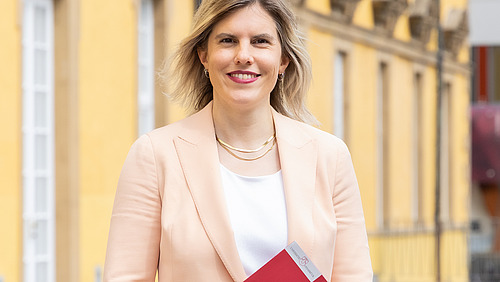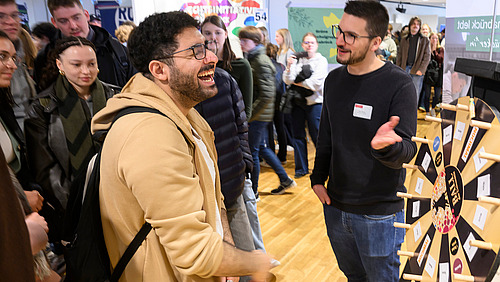When technical developments get ahead of regulation, lawyers quickly become spoilsports. If the rhetorical question as to whether this is "probably possible" is answered with a friendly but firm "probably not", the reproach follows on the heels of "why didn't you say that earlier?". "The simple explanation that we weren't asked is often true, but it hardly helps to alleviate the frustration," explains the course coordinator, Prof. Dr. Mary-Rose McGuire. The solution is obvious: lawyers and technicians must explain "their world" to each other and clear up misunderstandings at an early stage. The need for this is huge.
The new degree course offers precisely these "future skills". Lawyers are familiarized with the technical basics so that they can show ways in which a good idea can be implemented in compliance with the law. And technicians learn about the objectives that legislators are pursuing with regulation so that they can anticipate and avoid potential risks. Because not only data and AI, but also the European single market know no borders, the English-language course is based on European Union law. The Dean of the School of Law, Prof. Dr. Steffen Lampert, particularly emphasizes that students from all over Europe can apply: "With the new Master's degree course, the School is offering a purely English-language course for the first time. In doing so, we are not only taking into account the practical requirements of this highly specialized field, but also consistently developing the traditionally international orientation of the School of Law."
The EU has long recognized the great potential of new technologies, such as big data and artificial intelligence. European legislators promote innovation in many ways, but want to limit the potential risks for society. These necessary legal rules also conceal a large number of technical requirements that aim to make the use of data and AI safer for companies and consumers and prevent misuse such as hacking and industrial espionage. To ensure that products meet these requirements, these legal requirements must be taken into account during product development. But legal regulations only act as a ban if you think too late about the scope they open up. If considered in good time, they simply set the course for safe technology development and can be translated into concrete design decisions. This dialog is the basic concept of the interdisciplinary program, which is open to students with a first degree in law or engineering.
"Osnabrück University offers excellent conditions for this program with its research-strong European Legal Studies Institute, the School of Mathematics/Computer Science/Physics and the Institute of Cognitive Science," explains Vice President for Research Prof. Kai-Uwe Kühnberger. In cooperation with the research department "Cooperative and Autonomous Systems" of the German Research Center for Artificial Intelligence (DFKI), the theoretical foundations are linked with challenges, for example from projects. Other cooperation partners from the field open their doors to students and provide insights into the technology fields of logistics, platforms, smart cities, smart factories and smart farming.
Further information on the application on the website
Further information for editorial offices:
Prof. Dr. Mary-Rose McGuire, Osnabrück University
School of Law
elsi@uni-osnabrueck.de





